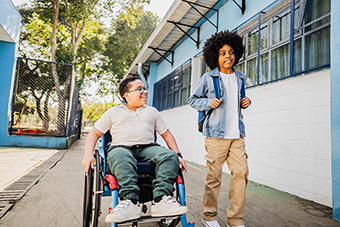Back to school with medical or behavioral conditions


Back to school with medical or behavioral conditions
The start of the school year is often an exciting time, but challenges can arise when children have a medical or behavioral health condition. The C.S. Mott Children’s Hospital National Poll on Children’s Health asked a national sample of parents of children 6-12 years about navigating the start of the school year.
One-quarter of parents (25%) report their child has a health condition that might require assistance at school (8% medical, 19% behavioral). Assistance might include classroom modifications (38%), getting health services (32%) or taking medication at school (21%), absences for appointments (18%), needing an emergency plan (14%), and having limits on certain foods (13%) or physical activity (7%). To set up assistance for their child’s medical or behavioral health condition at school, parents say they have met with classroom teachers (59%) or other school staff (60%), established a formal plan (47%), got information or advice from child’s healthcare provider (44%), and provided written emergency instructions (16%).
Overall parents describe their child’s feelings about the start of the new school year as excited (48%), confident (46%), nervous (27%), hopeful (18%), and grumpy (13%). Parents of children with a medical or behavioral condition are just as likely to describe their child as being excited about the start of school (52% vs 47%), but more likely to say their child is nervous (34% vs 24%) and less likely to say their child is confident (36% vs 49%) compared to parents who do not report any conditions for their child.
Concerns about the new school year are more common among parents of children with a medical or behavioral condition, related to adjusting to a new school or new teacher (44% vs 29%), dealing with conflict (43% vs 30%), staying healthy (39% vs 32%), keeping up with homework (38% vs 28%), and fitting in or making friends (39% vs 27%). Parents who do vs do not report their child has a medical or behavioral condition are less confident they can help their child have a positive school year (57% vs 71%).
Many parents would like school programs to learn how to support their child’s well-being, such as how to help children deal with conflict (59%), support their mental health (50%), and limit the impact of social media (32%). Parents of children with medical or behavioral conditions are more likely to want programs on how to support children’s mental health (64% vs 45%).

Highlights
- 1 in 4 parents say their child has a medical or behavioral health condition that requires assistance at school.
- Parents of a child with a medical or behavioral health condition are less confident they can help their child have a positive school year.
- Half of parents would like school programs to learn how to support their child's mental health.
Implications
The typical hustle and bustle of starting a new school year at the elementary level poses additional challenges when a child has a health condition. One in four parents in this Mott Poll indicated their child’s school experience may be impacted by a medical and/or behavioral health condition. Medical conditions range in severity and how much assistance or accommodation is required. For example, children with food allergies, asthma, or epilepsy require an emergency plan that outlines what to do if they have an allergic reaction, severe asthma exacerbation, or seizure. Many medical conditions require the child to take medication at school, which may require special considerations about where the medication is stored and who is trained to administer it. Behavioral health conditions include anxiety, attention deficit/hyperactivity disorder (ADHD), autism, or depression. Some behavioral health conditions require medication, and may warrant classroom accommodations.
A key aspect for parents in this Mott Poll was communication with school staff around the child’s condition. Naturally, parents want plans in place right at the start of the school year, but this may be unrealistic when teacher assignments and classroom rosters are in flux and school administrators have a range of competing demands. Parents may want to focus on emergency protocols first, sharing information from the child’s healthcare provider and ensuring the school nurse and other designated persons understand the steps of the emergency plan.
Notably, parents were not concerned only with managing their child’s health condition during school hours. Parents were also concerned about their child’s educational progress. Some children may need to attend appointments during the day, or their condition will cause them to feel too ill for school. Parents can help teachers understand the situation and determine the best ways for their child to keep up with schoolwork.
Some children with medical or behavioral conditions qualify for special education services and should have an Individualized Education Plan (IEP) that details specific services and assistance that will be provided at school to help them succeed academically and socially. Children with a disability, whether or not they qualify for special education, may benefit from a 504 Accommodation Plan, which outlines measures to remove any barriers to fully participating in the curriculum, such as modified seating assignments or schedules, medication access, staff training on emergency procedures, and safety protocols for physical activity. IEPs and 504 plans should be reviewed and updated every year. Parents may want to get input from the child’s healthcare and behavioral health providers to ensure the plan is up-to-date and that it accurately describes the child’s needs related to physical activity, medications, and expected absences.
Many parents also expressed concerns about their child’s social life. Typically, a new school year means new classmates, and some children have a harder time making friends and fitting in. They may even be worried that other children will make fun of them or tease them because of their condition. Parents can help their child learn how to explain their condition when their classmates are curious. Providing an age-appropriate book for the teacher to read to the class or having the parent and child do a “show and tell” about the child’s condition may be helpful. For the child’s classmates, this presents an opportunity to learn about accepting differences and showing friendship and support.
As parents look to implement medical, educational, and social supports for their child, they should schedule meetings at times when classroom teachers and other essential staff are available, rather than trying to have an unscheduled conversation while teachers have other responsibilities. Teacher conferences, which often occur a few weeks into the school year, are great times to check in, share concerns and tips about what works at home, and get teachers’ input about their child’s needs and progress.

Data Source & Methods
This report presents findings from a nationally representative household survey conducted exclusively by Ipsos Public Affairs, LLC (Ipsos) for C.S. Mott Children’s Hospital. The survey was administered in August 2025 to a randomly selected, stratified group of adults who were parents of at least one child age 1-17 years living in their household (n=2,029). Adults were selected from Ipsos’s web-enabled KnowledgePanel® that closely resembles the U.S. population. The sample was subsequently weighted to reflect population figures from the Census Bureau. The survey completion rate was 66% among panel members contacted to participate. This report is based on responses from 1,101 parents with at least one child age 6-12. The margin of error for results presented in this report is ±2 to 6 percentage points.
Findings from the C.S. Mott Children’s Hospital National Poll on Children’s Health do not represent the opinions of the University of Michigan. The University of Michigan reserves all rights over this material.
Citation
Woolford SJ, Gebremariam A, Schultz SL, Frisk C, Clark SJ. Back to school with medical or behavioral conditions. C.S. Mott Children's Hospital National Poll on Children's Health, University of Michigan. Vol 48, Issue 1, September 2025. Available at: https://mottpoll.org/reports/back-school-medical-or-behavioral-conditions.

